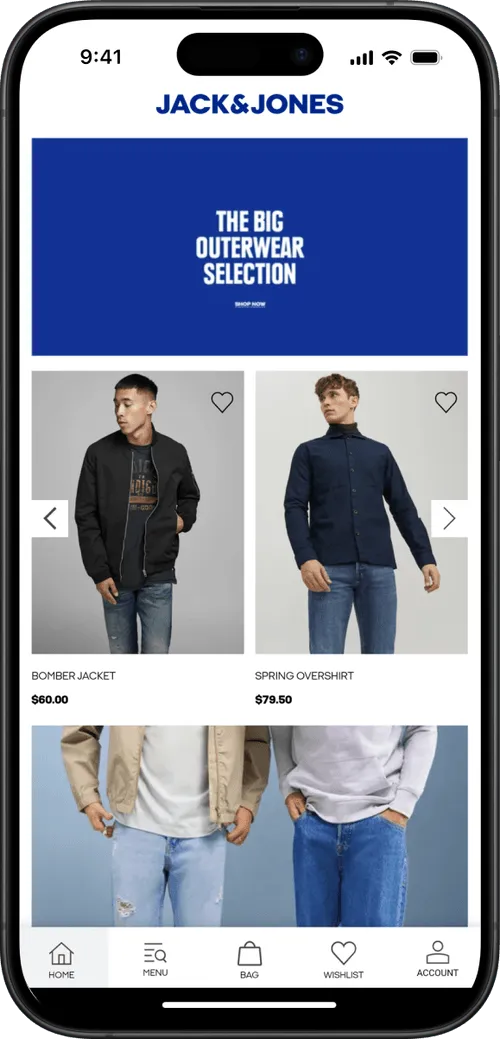The 6 Best Low-Code Mobile App Development Platforms
- If you want more control over your app building, low-code app builders combine drag-and-drop, DIY app builders with the ability to write code to implement custom features, designs, and workflows in your app.
- Some low-code platforms use proprietary programming languages not used elsewhere; others use common languages like JavaScript. Keep this in mind when choosing your platform, because there may be a learning curve.
- Low-code app builders may not let you reuse code you have already created for your website, which may mean rewriting features you already have to get them to work and having two separate backends or workflows.
- MobiLoud can turn your existing website into a fully-functional app with all your custom code, features, and design elements in place with no coding needed from you, unlike low-code solutions.
- If you want more control over your app building, low-code app builders combine drag-and-drop, DIY app builders with the ability to write code to implement custom features, designs, and workflows in your app.
- Some low-code platforms use proprietary programming languages not used elsewhere; others use common languages like JavaScript. Keep this in mind when choosing your platform, because there may be a learning curve.
- Low-code app builders may not let you reuse code you have already created for your website, which may mean rewriting features you already have to get them to work and having two separate backends or workflows.
- MobiLoud can turn your existing website into a fully-functional app with all your custom code, features, and design elements in place with no coding needed from you, unlike low-code solutions.
If no-code mobile app builders are too limiting for your needs, but diving into the deep end and building an app from scratch seems like an expensive step too far, then low-code mobile app development platforms may be the perfect middle ground you’ve been looking for.
Low-code mobile app builders let you combine the advantages of no-code solutions, such as their DIY ease-of-use, drag-and-drop interfaces, and speedy app-building timelines, with the advantages of writing your own lines of code when you want to enable further customization, features, and workflows.
Since there are so many low-code app development platforms available today, it can be intimidating to choose the best one for you. To help you decide, here are our top six picks for the best low-code mobile app builders.
Curious about the differences between low-code and no-code app building? Read our full guide here.
1. MobiLoud

MobiLoud is not a low-code app builder per se, but we can take your existing website and all its associated code you have already written and turn it into an app. This approach lets you customize the code on your website as you see fit, and then all that functionality survives intact on your mobile app. More than 2,000 brands have trusted Mobiloud, including Jack & Jones, Vero Moda, and Estee Lauder, with 150+ reviews averaging 4.8/5.
Using this approach, you can optimize your online presence with your website, and we’ll do all the work of making an app. Unlike the other low-code app builders on this list, no matter what features your website uses, we can implement them on mobile.
You also avoid the hassle of trying to fit your app into the templates or the methods of existing low-code app builders. You keep all of the hard work you’ve already done.
And we have built all sorts of apps for various companies, including fashion retailers, magazines, and music festivals.
Our pricing plan is also simple and transparent, with options to suit startups, small businesses, and established companies.
Whether you want a highly complex website full of custom code turned into an app or you have a simple WordPress site that you want to be ported to mobile, MobiLoud can do it.
Pros
- Turns your existing website into an app
- Reuses all the custom code that you already wrote
- Simple, transparent pricing tiers
Cons
- Requires you to have a website created already
- May not be able to harness some native mobile device features
2. Zoho Creator

Zoho Creator is a low-code app development platform with an easy-to-use interface and many pre-built components. It is worth a look if you have a general idea of the app you want to build but need the help of custom code to put the pieces together.
The interface is rather minimalistic, so there’s no clutter to bog you down. Some pre-built apps can be used as jumping-off points, and then you can customize your apps using Zoho’s proprietary Deluge language. It also includes drag-and-drop elements if you aren’t quite as experienced with coding.
The apps you build let you easily incorporate forms, workflows, and other elements. If you want, you can opt to add AI that can digest data you already have to make predictions about the future, process bills and receipts, and perform other handy operations.
But the major hangup with Zoho is with Deluge. It’s not an openly accessible programming language like JavaScript or C++. Instead, you have to learn its unique quirks and structures. Many developers find it easy to grasp fairly quickly, however.
Still, it’s worth noting that any code you write within Zoho Creator using Deluge won’t be of much use outside of it.
Also, note that pricing starts at $12 per user per month and goes up from there. “Users” means the number of people with access to Zoho Creator, so the larger your team of developers, the higher the costs to build an app.
As a result, Zoho Creator is best if you don’t mind a high degree of vendor lock-in in exchange for lots of customizability and access to many pre-built apps. If you have an app that can be built using primarily drag-and-drop elements but want to round it out using custom code, it could fit that niche nicely.
Pros
- Simple, clean interface
- Lots of pre-built apps to get you started
- Deluge programming language is powerful
Cons
- Deluge is propriety to Zoho
- Can’t reuse your existing website’s code and features
3. Retool

Retool is a low-code app builder that lets you integrate many of the development methods used in from-scratch app building with the advantages of pre-built, drag-and-drop components. If you want tighter control over timelines and resources than other app builders provide, give it a look.
Retool lets you do version control via Git, so you can track changes to your app as they occur and iterate on ideas. Templates are available to get you started, too, including dashboards, order reports, inventory tools, and more.
In addition, plenty of integrations and components are available. These include icons, buttons, fonts, data visualizations, tabs, lists, and more.
Once you have things arranged the way you want in Retool, you can use JavaScript and SQL to write custom code. This works anywhere, so you aren’t limited to customizing only certain components or workflows.
JavaScript and SQL are pretty well-known programming languages and do not have the vendor lock-in problems of Zoho Creator’s Deluge or other proprietary languages, so that is handy.
However, Retool is not just for building mobile apps. Technically, you can code almost anything with Retool, but this lack of specialization does mean a steeper learning curve. Since it is not only for building mobile apps, it has many features you may not need.
Pricing begins at $10 monthly per standard user and $5 additionally per end user. Basically, this means it's $10 per month for each person with full access to Retool and an additional $5 per month for any users with limited access permissions to Retool who aren’t a part of your organization. There is a free tier, but it lacks app release versions, which is a key feature of Retool.
Therefore, Retool is best if you truly are not afraid of code and don’t mind getting your hands dirty from time to time. But if you need some more hand-holding, it may feel a bit overwhelming.
Pros
- Can create almost any kind of program in addition to apps
- Version control
- Can insert custom JavaScript and SQL code anywhere
Cons
- Steeper learning curve
- Not exclusively for building mobile apps
- May not be able to reuse your existing website’s code and functionality
4. Kissflow

Kissflow is another low-code software builder, but it has specific tools for creating enterprise mobile apps in particular. It has a fluid, simple interface that lets you drag and drop elements and then dive into code if you wish.
For example, you can drop in a component and edit it visually. Once everything looks the way you want, you can add code or change existing code to customize the app. There are also automated workflows that you can edit visually or via code.
You can start with a template if you wish, too. After that, you can tie in integrations and analytics. If you want some more hand-holding, some pre-built apps are available, but you will have to pay for them.
Kissflow claims that Kissflow Apps is not focused on a single programming language, but their SDK is based on JavaScript. So, effectively, it is tied to JavaScript. That’s not too big a deal at the end of the day, though.
JavaScript is well-known and widely used, as we mentioned earlier. You can likely find people who are deeply familiar with it without too much hassle.
However, the major drawback of Kissflow is pricing. The basic plan starts at $1,500 monthly. That may put it out of reach for many small businesses. Furthermore, the enterprise plan is on a get-in-touch pricing basis.
Kissflow is likely best for deep-pocketed companies that want a low-code app development platform that lets them visualize the app they want and then tailor it to their needs as they go. Smaller businesses or startups, however, will likely be priced out.
Pros
- Easy-to-use interface
- Pre-built apps and templates available
- JavaScript-based
Cons
- Expensive and pre-built apps are also paid
- May not be able to reuse your website’s existing code and functionality
5. Microsoft Power Apps

Microsoft has an entry in the low-code app builders game with Power Apps. Its main highlighted feature is the integration of AI into many parts of the app-building process.
That is, you can describe the app you want to Microsoft Copilot, and it will design the app for you. After that, you can edit it, refine it, and add customizations. You can also use AI suggestions while building an app to include code and features along the way.
But if you want more traditional drag-and-drop low-code development, that is also possible. You can begin with templates and add in the features you want, and then dive into the code if you wish.
On that note, Power Apps uses Microsoft PowerFx, a programming language that is not too complicated. However, like Zoho’s proprietary Deluge language, it is not used much outside of the Microsoft Power Apps ecosystem.
As a result, if you have existing developers with knowledge of, say, JavaScript or another language, they will have a learning curve when adopting Microsoft Power Apps.
Pricing begins at $20 per user per month for Power Apps Premium. There is also a more limited free tier. However, if you want to use the AI features in Power Apps, you only get 500 credits with the $20 plan. To get more, you need to add the $500 per month AI Builder add-on package.
So, Power Apps is likely best if you want to experiment with AI and are willing to adopt a proprietary programming language. Just be aware of the vendor lock-in this leads to.
Pros
- AI-enabled features
- Drag-and-drop components can be customized with code
- Templates available
Cons
- AI is limited unless you purchase an add-on pack
- Microsoft PowerFx programming language is proprietary
- May not be able to reuse your existing website and code
6. Google AppSheet

Google has also thrown its hat into the low-code app-building ring with AppSheet. It functions primarily as a drag-and-drop DIY app builder, but you can customize your code with spreadsheet-like expressions. This does mean it leans more into no-code territory, though.
You begin with a spreadsheet or database you want to base your app on, hence the name AppSheet. If you don’t have one, you can start with a template instead.
From there, the data gets ingested into the app builder, and you can edit the resulting app. You can also set up automations and other features. This is where spreadsheet-like expressions come into play. You can use them to create filters, dynamic UI elements, and a few other features.
Pricing for Google AppSheet begins with a free tier, but this plan is very limited and is for up to 10 users. The next level up is $5 monthly, but this is still quite basic. More advanced features do not start until the enterprise-level tiers, such as cloud storage support, team management, and machine learning.
This means that the best use case for Google AppSheet is likely in-house apps that solve a particular pain point within your organization, such as streamlining workflows or getting teams in sync. Otherwise, more advanced apps may not be possible since this low-code solution is quite close to a no-code DIY app builder at the end of the day.
Pros
- Can take a spreadsheet and turn it into an app
- Easy-to-use app-building interface
- Templates are included
Cons
- Very low-code to the point of almost being no-code
- Likely cannot produce sophisticated, customer-facing apps
- Likely cannot reuse your existing website and code
The best low-code mobile app development platforms: Final thoughts
Low-code app development platforms could be a good way to create an app if you need more functionality than no-code solutions can offer but do not want to deal with the overhead and hassle of hiring a team of coders or doing everything in-house.
Still, they aren’t without their faults, either. You may encounter vendor lock-in, where platforms like Zoho or Microsoft Power Apps use proprietary programming languages that aren’t used anywhere else.
Alternatively, you may use platforms like Retool that stick to JavaScript and SQL, two widely-understand programming languages but which teeter into fully-fledged programming interfaces. This is handy, but it also reduces the usefulness and ease of the low-code approach.
Instead of trying to strike this hard-to-find balance, you could turn your existing website and all of its associated code and functionality into an app with MobiLoud. You avoid the hassles of vendor lock-in or coding anything yourself. We do all the work, and you end up with a fully functional mobile app.
And much like with low-code app builders, you can get a free preview of your app in under 30 seconds.
Contact us today to find out how to turn your existing website into an app.
FAQs
Convert your website into a mobile app











